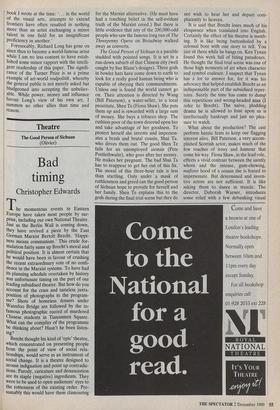Theatre
The Good Person of Sichuan (Olivier)
Bad timing
Christopher Edwards
The momentous events in Eastern Europe have taken most people by sur- prise, including our own National Theatre. Just as the Berlin Wall is coming down, they have revived a piece by the East German Marxist Bertolt Brecht. 'Happi- ness means communism.' This crude for- mulation fairly sums up Brecht's moral and Political position. It is almost certain that he would have been in favour of crushing the recent extraordinary vote of no confi- dence in the Marxist systems. To have had its planning schedule overtaken by history was unfortunate timing on the part of our leading subsidised theatre. But how do you account for the crass and tasteless juxta- position of photographs in the program- me? Shots of homeless dossers under Waterloo Bridge are followed by the in- famous photographic record of murdered Chinese students in Tiananmen Square. What can the compiler of the programme be thinking about? Hasn't he been listen- ing?
Brecht thought his kind of 'epic' theatre, which concentrated on presenting people from the point of view of social rela- tionships, would serve as an instrument of social change. It is a theatre designed to arouse indignation and point up contradic- tions. Parody, caricature and denunciation are its staple (negative) ingredients. They were to be used to open audiences' eyes to the rottenness of the existing order. Pre- sumably this would have them clamouring for the Marxist alternative. (He must have had a touching belief in the self-evident truth of the Marxist creed.) But there is little evidence that any of the 200,000-odd people who saw the famous long run of The Threepenny Opera on Broadway walked away as converts.
The Good Person of Sichuan is a parable studded with pointed songs. It is set in a run-down suburb of that Chinese city (well caught by Sue Blane's designs). Three gods in bowler hats have come down to earth to look for a really good human being who is capable of obeying their commandments. Unless one is found the world cannot go on. Their attention is directed by Wang (Bill Paterson), a water-seller, to a local prostitute, Shen Te (Fiona Shaw). She puts them up and is rewarded with a large sum of money. She buys a tobacco shop. The ruthless poor of the town descend upon her and take advantage of her goodness. To protect herself she invents and imperson- ates a brash and brutal cousin, Shui Ta, who drives them out. The good Shen Te falls for an unemployed airman (Pete Postlethwaite), who goes after her money. He makes her pregnant. The bad Shui Ta has to reappear to get her out of this fix. The moral of this three-hour tale is less than startling. Only under a mask of ruthlessness and greed can the good person of Sichuan hope to provide for herself and her family. Shen Te explains this to the gods during the final trial scene but they do not wish to hear her and depart com- placently to heaven.
It is said that Brecht loses much of his eloquence when translated into English. Certainly the effect of his theatre is numb- ing. It is like being buttonholed by a colossal bore with one story to tell. You just sit there while he bangs on. Ken Tynan found this work full of biting paradoxes. He thought the final trial scene was one of those high moments of art when character and symbol coalesce. I suspect that Tynan has a lot to answer for, for it was his advocacy that helped establish Brecht as an indispensable part of the subsidised reper- toire. Surely the time has come to dump this repetitious and wrong-headed man (I refer to Brecht). The naïve, plodding drama he is allowed to foist upon us is intellectually bankrupt and just no plea- sure to watch.
What about the production? The cast perform heroic feats to keep our flagging interest alive. Bill Paterson, a very accom- plished Scottish actor, makes much of the few touches of irony and humour that come his way. Fiona Shaw, in the lead role, effects a vivid contrast between the saintly whore and the intense, gum-chewing, mafioso hood of a cousin she is forced to impersonate. But determined and inven- tive actors are not sufficient. It is like asking them to dance in treacle. The director, Deborah Warner, introduces some relief with a few debunking visual gags (gods with feathered wings descend- ing on wires). But throughout this produc- tion you kept asking yourself why anyone should have wished to stage the play. If Brecht did not exist nobody now would choose to invent him.











































































 Previous page
Previous page